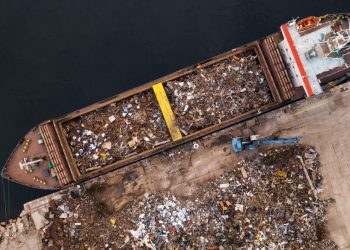The Bahamas Maritime Authority (BMA) has issued a safety alert to provide practical interim guidance on incorporation of the use of lower greenhouse gas (GHG) emission sustainable fuels (biofuels) in Carbon Intensity Indicator (CII) calculations.
As explained, this Alert has been prepared on the basis of the decision by the 80th Marine Environment Protection Committee (MEPC) of the International Maritime Organization (IMO) outlining the methodology of accounting for biofuel emissions in CII calculations, as indicated in MEPC circular MEPC.1/Circ.905.
The Bahamas Maritime Authority (BMA) will remain flexible in accommodating the evolving approach by the IMO to the use of the alternative fuels in the marine industry and further information will be provided as the ongoing MEPC Committee work on the sustainable fuels Life Cycle Analysis (LCA) principals develops.
This Alert should be read in conjunction with:
- Regulations 26, 27 and 28 of Annex VI of the International Convention for the Prevention of Pollution from Ships, 1973, as amended (MARPOL Annex VI)
- IMO Resolutions MEPC.346(78), MEPC.348(78), MEPC.352(78) and MEPC.355(78)
- IMO Circular MEPC.1/Circ.795/Rev.7
- BMA Marine Notices MN061 and MN063
The BMA offers the following interpretations of the provisions of MEPC.1/Circ. 905:
- Only biofuels certificated as sustainable on full well-to-wake GHG emissions by an international scheme may be considered as having a lower CO2 Emission Conversion Factor Cf in line with the details of their certification;
- Non-certified biofuels, or those not meeting the full well-to-wake GHG emission criteria shall not be considered as having a lower CO2 Emission Conversion Factor Cf and shall therefore be accounted for in terms of their GHG emission to the equivalent fossil fuel for CII calculation;
- The BMA will not consider any biofuel as having a Cf factor of below zero, irrespective of its certification. In cases where an Emission Conversion Factor may be reflected in the certification as being below zero the actual Cf taken for CII calculation shall be 0;
- Biofuels certified by an international scheme shall be considered a biofuel with its sustainability certificate issued on the basis of any existing or future certification scheme recognised by an international organisation;
- Sustainability certification issued under the provisions of multinational regional competent authorities or individual State’s national governmental agency may be accepted where a ship consuming such biofuel is operating at all times between the ports and localities under their respective jurisdiction(s) and the high seas.
- Applications for acceptance shall be to the BMA via the recognised organisation that classes the ship;
- Biofuels achieving a certified well-to-wake GHG emission reduction of 65% or more in comparison to a fossil MGO (95 gCO2e/MJ) can be accepted. Biofuels achieving a certified well-to-wake GHG emission reduction of below 65% may be considered by the BMA where a ship is operating at all times on such grades of biofuel.
- Applications for acceptance shall be to the BMA via the recognised organisation that classes the ship;
- A Bunker Delivery Note (BDN) containing the mandatory information required by Regulation 18.5 of MARPOL Annex VI, as appropriate, accompanied by a document confirming the biofuel properties as outlined in paragraphs i. to vi. above shall be provided to the ship at each biofuel bunkering by the supplier. A failure of the supplier to provide the above stated documents and/or an accompanying representative sample shall be treated in a similar manner as fossil fuel supply as per Regulation 18.9 of MARPOL Annex VI.
- A document confirming the supplied biofuel properties shall be appended to the respective BDN and retained on board mas required by Regulation 18.6 of MARPOL Annex VI.
This Technical Alert is valid until 31 December 2023 or until Marine Notice 61 and 63 have been updated, whichever comes first.






























































